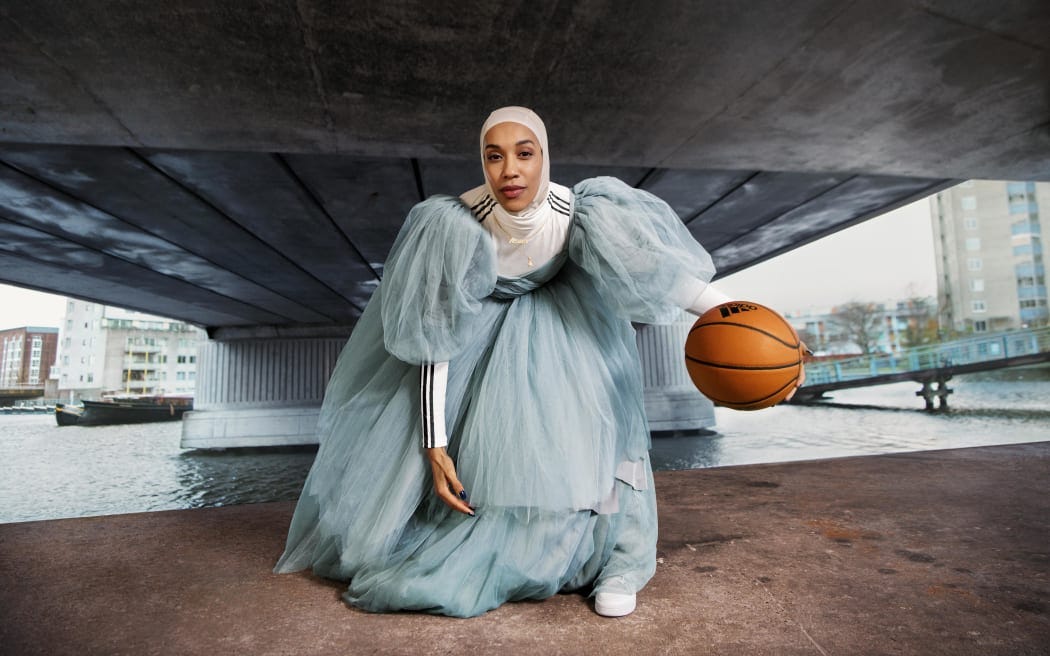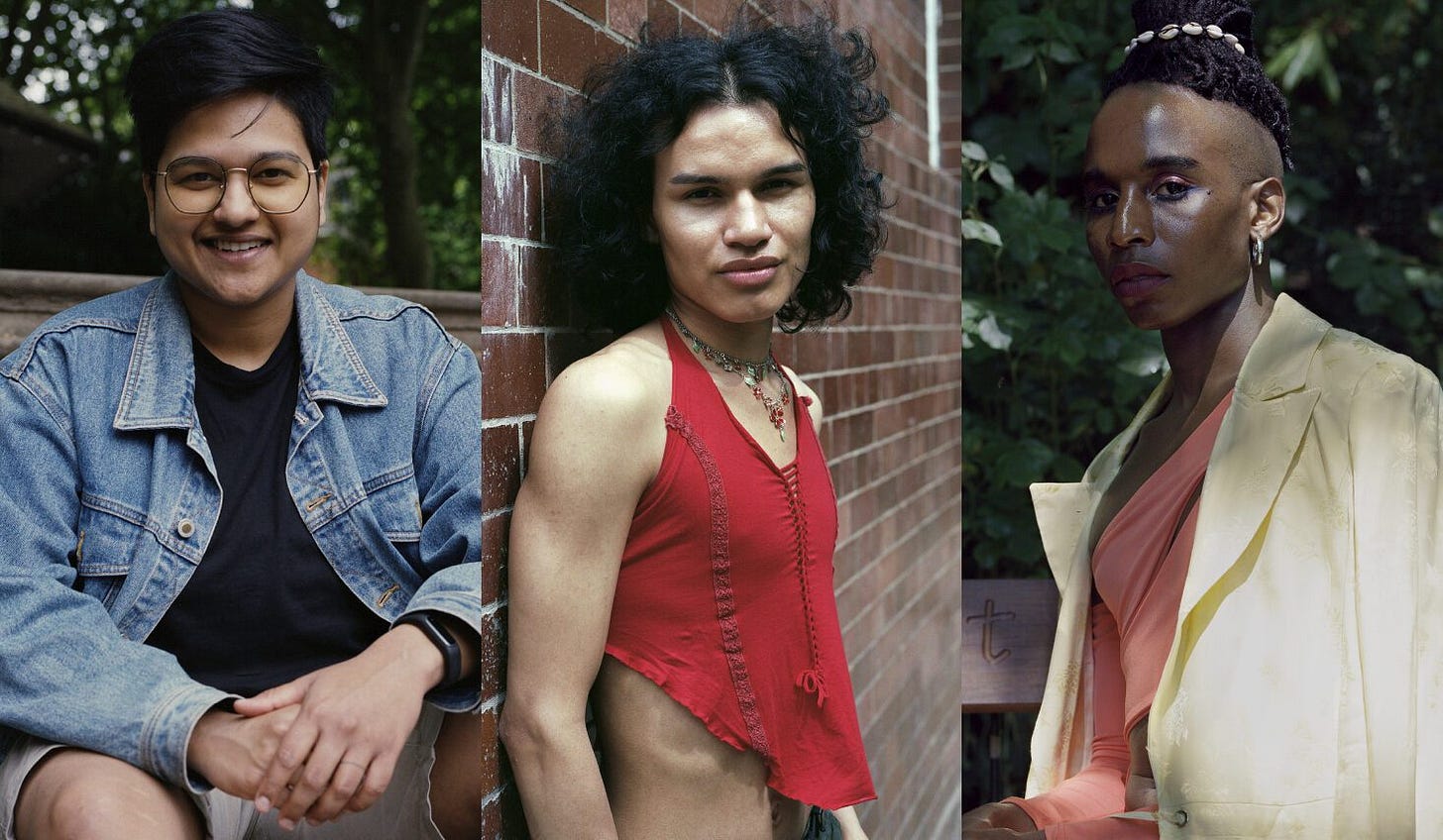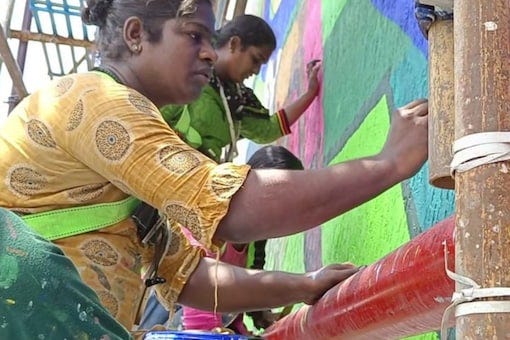Global Roundup: Black Women & Farm Ownership, China Crackdown on LGBTQ Students, Muslim Women in Sports, Trans and Non-Binary Immigrant Photo Series, India Trans Women Paint Murals
Curated by FG contributor Samiha Hossain
Clarenda Stanley.Courtesy Clarenda Stanley via NBC News
Clarenda Stanley decided to leave her white collar job in the U.S. and start her very own farm. Even though she came from a long line of farmers and grew up on a farm herself, her family always viewed her white collar job as a much better option than the pastoral life.
Stanley runs Green Heffa Farms, now a successful tea and herbal-blend business, named in honor of her quick witted grandmother Charity Mae. She has been growing flowers, herbs, teas and other medicinal plants all with the goal of healing, on her own farm in Liberty, North Carolina, since 2018.
Because of the trauma that’s been inflicted on the Black community, Indigenous community, when it comes to land, a lot of us have lost that connection, and we don’t look to the land for some of the reinforcements that we need for our well-being. I really want it to ... look at farming as being reparative, in the sense that it’s reconnecting us to the land and doing it through medicinal plants, which before there were all these pharmaceuticals that’s what we’d use, that’s what we’d turn to. -Clarenda Stanley
In building her own farm, Stanley experienced the many roadblocks that Black farmers face. Banks denied her loans, and she said her farming instructors doubted her success. The U.S. Department of Agriculture has paid billions over the past several years in discrimination settlements, admitting that Black farmers were stalled or stopped from entering the agriculture space without justification. One study also found that Black-owned farms were smaller, less profitable and received less government assistance when compared with other farms in the U.S.
Stanley is part of the less than 1% of Black rural landowners in this country. These statistics have motivated her to bring other Black women into agriculture to find their own source of healing and freedom. She has created a social media platform using the name “FarmerCee” to educate others on how to secure land, write grants for funding and share insight on some of the challenges farmers face.
I don’t anticipate America to get things right during my lifetime, and it’s not me being a pessimist. It’s just looking at where we are now. I also don’t even pretend to be able to offer a solution to a problem that the ones who are responsible for carrying forth the tradition of this problem aren’t addressing. For me, it’s more about how do we create as much Black joy as possible? -Clarenda Stanley
Flags left in Tsinghua University, which administrators deemed a code of conduct violation. via SupChina
Two students from Beijing’s Tsinghua University, one of China’s most prestigious universities, have been disciplined for handing out a small number of rainbow flags at an on-campus location, an act condemned by the school as a violation of its student code of conduct. This recent incident is yet another example of the space for LGBTQ activism in China rapidly shrinking.
According to a WeChat post that went viral last week before being deleted, the two students, referred to as Huang and student Li, left 10 rainbow flags at an on-campus convenience store in May, along with a brief note encouraging people to take the flags and celebrate “#PRIDE.” In June, both of the students received letters of pending penalty, which accused them of “distributing promotional materials on campus without authorization.” The pair petitioned to have the penalty overturned, but their appeals did not receive any response. In mid-July, they were hit with two formal disciplinary warnings saying that they had caused “a negative impact” by distributing unauthorized rainbow flags on campus. The punishment means they cannot receive scholarships or awards for six months and if they break another university rule during the period, they might receive a more serious penalty that “could appear on their personal file and rule them out for civil service and state-owned-enterprise jobs.”
When I attended university in Beijing, which was between 2007 and 2011, I couldn’t find any LGBT group in my school. There was already internet censorship of [LGBTQ topics] back then. -Diǎn Diǎn 典典, doctoral researcher currently based at Emory University
In 2008, Dian attempted to form a group for queer students in Beijing, but her recruitment post on the social media platform Baidu Tieba was quickly censored and her account was suspended. Despite the failed attempt, Dian managed to find communities outside her school. She joined an LGBTQ non-profit organization as a volunteer and became involved in queer activism. According to Dian, although LGBTQ student groups were scarce at the time, gender and sexuality issues were occasionally discussed by other student organizations such as sex education groups. It was in cooperation with these groups that local NGOs started to organize queer activities on college campuses. After the early 2010s, a cohort of groups dedicated to LGBTQ issues and led by queer students emerged.
Dian suspects that the intensified crackdown on LGBTQ student groups in the past two years was prompted by the active role of students in several social movements in 2018, especially the #MeToo movement, which first took off in Chinese universities, and campaigns advocating for labor rights.
In China, any organized activity can easily become the target of surveillance. The intention is to isolate the students. -Diǎn Diǎn 典典
Asma Elbadawi in her Adidas brand campaign. Photo: Supplied / Adidas via RNZ
The Sudanese-British coach says she originally played netball at an all-girls Islamic school, but wasn’t sure if she could pursue it after leaving school. However, being left without sports for two years made her feel down and as if something was missing, leading her to pursue basketball. Muslim women are just as capable and strong as any other to compete in sports, but hijab bans have eliminated visibility at elite levels, she says.
[Hijab bans] basically deny a whole generation from dreaming and from seeing other women who look like them or worse; I think it creates this idea that the faith has something against Muslim women playing sport. And the community isn’t that helpful at times because of the cultural ideas around females and sports and there’s a lot of conversations about is it modest or is it even allowed? So, the more women that we have on the screen and the more women that are competing, the more we can break those kinds of stereotypes and barriers. -Asma Elbadawi
Elbadawi’s involvement in a campaign to challenge the International Basketball Federation’s hijab ban came about after a former professional player told her she was forced to quit after deciding to wear the headscarf. They put a petition up which got over 130,000 signatures. Having more uniform options keeps women and young girls in sports, regardless of faith, she says, as people’s comfort levels vary with how much skin they want to show.
Elbadawi is open about the fact that despite her successes, she still has down days and experiences challenges. Her message to aspiring people is to never limit yourself.
If you’re passionate about sport, pursue that and try to get to those elite levels. If you’re passionate about art, then follow those dreams. We live in a time where nothing is impossible. -Asma Elbadawi
Via Gay Times
Emil Lombardo, an Argentinian-born photographer based in London, has spotlighted various trans and non-binary immigrants in the UK for a stunning new photo series. As a non-binary transmasc immigrant, Lombardo says it was important for him to tell the stories of those who “share a similar journey” to him, who moved to a “different country for a better life” but soon realized it was “not as as easy as expected.” Lombardo’s photo series is part of a GAY TIMES and Channel 4 campaign to spotlight local Pride events across the UK, titled #ProudAllOver. Lombardo says it is important to “highlight local stories” due to the mainstream media’s focus on Pride events in major cities. I will be sharing a few of the people in Lombardo’s photo series.
The media only writes about trans people when they want to debate our existence. Queer folks rarely have the space to tell their side of the story, and we are so tired of the cis-het gaze. We must be the ones telling our stories. -Emil Lombardo
Kika from Uruguay says Pride for them is more about protesting than celebrating. They say that Uruguay is still “close-minded,” despite the many laws that are supposed to help queer people.
In Uruguay I never feel I can dress in the way I got dressed today for the photoshoot without fearing harassment. Leaving my country was an opportunity to explore my gender and my identity in general. -Kika
Jo says that moving from India to the UK made them feel “survivors’ guilt,” because they arrived in 2019 when the trans bill was introduced in India, which was “extremely violent for trans people.”
…I felt like I left my community and came here while at the same time, when you think about it, you’re like, ‘What would I have done? I did want to do my PhD.’ It doesn’t mean that I am completely out from my community there, thanks to technology, I’m able to stay in touch and do the work. -Jo
Diamond, who recently moved from Botswana to London, is still discovering the city. They are grateful for the support from the queer community and say they are much happier and smile more now.
As a non-binary person, Pride in general means freedom. It means expression. It means the liberation of human rights. But it also means that we still need to keep on carrying on and fighting. -Diamond
Chennai trans women's paintings depicting the five ecological regions mentioned in ancient Tamil Sangam literature are displayed on the walls of Alandur Metro Station via News18
Their paintings depicting the five ecological regions mentioned in ancient Tamil Sangam literature –Kurinji, Mullai, Marutham, Neithal and Paalai– are displayed on the walls of Alandur Metro Station. Pedestrians and motorists are amazed when they look up at the paintings, as the artists can be seen hanging off the wall several feet above ground with safety equipment. One artist, Kanchana, danced in stage performances for many years and received mural training from her group. She said that she has painted in many cities and explained how transgender people continue to experience numerous taunts and exclusions from the society and that with these paintings, they are demonstrating their ability to overcome these obstacles.
Smitha Abhimukta, another artist, expressed optimism that transgender individuals can improve their lives if the general society becomes more inclusive towards them. In an effort to dispel misconception and stereotypes, transgender people have asked the state government to keep offering them opportunities like these so they can receive the recognition they deserve. They said that they participate in this form of art in order to succeed and to express themselves.
Samiha Hossain (she/her) is a student at the University of Ottawa. She has experience working with survivors of sexual violence in her community, as well as conducting research on gender-based violence. A lot of her time is spent learning about and critically engaging with intersectional feminism, transformative justice and disability justice.
Samiha firmly believes in the power of connecting with people and listening to their stories to create solidarity and heal as a community. She refuses to let anyone thwart her imagination when it comes to envisioning a radically different future full of care webs, nurturance and collective liberation.






